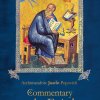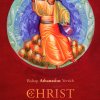by Archimandrite Justin Popovich
This Commentary on the Epistles of St. John the Theologian - published now, three years after the blessed repose of Venerable Fr. Justin (on the Feast of the Annunciation, 1979) - was written by the tireless Messenger of Christ forty years ago, in circumstances similar to those in which Christ's Holy Evangelist John wrote his sacred Epistles.
The text of this 93-page soft-bound book has been translated from the Serbian by Radomir M. Plavsic. Published by Sebastian Press, Western American Diocese of the Serbian Orthodox Church, Contemporary Christian Thought Series, number 5, First Edition, ISBN: 978-0-9719505-6-6





